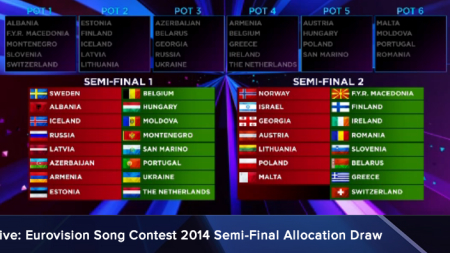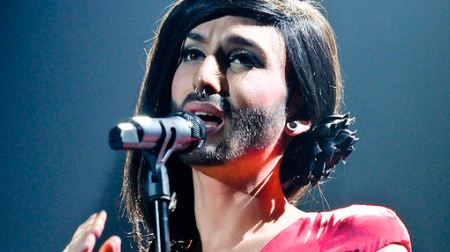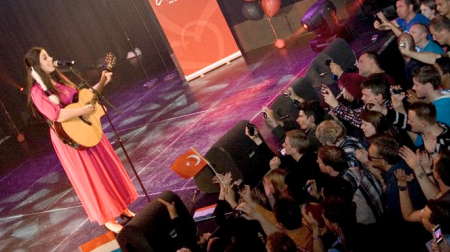Just like that, we have the draw for the semi-finals of this year’s Eurovision Song Contest.
Delegations are away to book hotel rooms, look at the cost of flights, and lock in all their travel plans for two weeks in Copenhagen. Latvia will be tightening the purse strings as they’ll be asked to arrive for the first day of rehearsals, while the ‘we’re not quite sure we can afford it’ Slovenia can stay at home for three extra days until they are needed during the fourth day of rehearsals.
But we’re not going to look at the logistics just yet. No, it’s time to decide who is going to qualify from the semi-finals, even though we have only heard three songs (and the chances are two will have a significant remix, and the ‘Cheesecake‘ will go off by May to be replaced by ‘Danish Pastry‘).
Rather than go for an emotional response or a gut feel, we’ve taken the information from today’s draw, fed it into a very complicated spreadsheet of historical data and trends, and come up with a statistical prediction for the ten qualifiers out of each semi-final.

See that gap under Malta? Morocco could have been there…
Semi-Final One
The first semi-final has a much wider range of success, and with eight countries that have qualified at least two contests out of three, there’s a clear pack breaking away in the statistics. After that pack, Albania stands alone with a better than 50% record, and you’re hard pushed to split Portugal and Estonia… but the returning Portuguese are in the bottom half of the draw, so are pushed into the top predicted top ten.
Our computer prediction (in alphabetical order) predicts the SF1 qualifiers will be:
Albania, Azerbaijan, Armenia, Hungary, Iceland, Moldova, Portugal, Russia, Sweden, Ukraine.
As always, my heart looks at that list and does wonder how Albania are on that list, when I really want to put the Netherlands in there, but part of the fun with this analysis is to remove any emotion from this, and take a clinical look at the voting patters, diaspora, and cultural voting blocks that exist in the Contest.
Of course there will be emotions coming in to play, because that’s why songs have power. One badly sung key change from a country, coupled with a knock ’em dead moment from another country could easily see a country like Iceland being replaced by Latvia.

One Step Further for Valentina?
It’s also worth noting that most of the heavy hitters in the Semi-Final draw have ended up singing on Tuesday. Nine countries have a an average score of more than 90 points in a Semi-Final, and six of them are in this first show. Three of the five ‘perfect record’ countries (Azerbaijan, Russia, and Ukraine) are present. I feel sorry for Montenegro and San Marino, the two countries who have never qualified, being drawn in this round.
Semi-Final Two
The second semi-final has far more ‘mid-field’ countries, with nine countries out of the fifteen with a better than 50% record of qualifying, it looks like all the mid-field runners will join the two 100% countries of Greece and Romania for the Grand Final on Saturday May 10th. Much as my heart would love Poland to return to the final on their return and join Portugal on a successful re-engagement, Israel look like taking the last spot.
Our computer prediction (again in alphabetical order) predicts the SF2 qualifiers will be:
Finland, Georgia, Greece, Ireland, Israel, Lithuania, Macedonia, Malta, Norway, Romania.
You might as well place Greece, Romania, and Georgia, in a breakaway group here, because they are far stronger than everyone else. Norway and Finland both have a relatively good record, and should be able to support each other, but with the bulk of the Scandinavian votes in the first Semi-Final, they are both vulnerable. If I was looking for a shock result, Norway not qualifying would be an outside bet.
On the bubble for qualification are Macedonia, Israel, and Poland. Israel are singing in the first half, but Macedonia and Poland are going to struggle to find any natural supporters, hence the slight bias to Israel. Switzerland and Austria are rather isolated when compared to the rest of the pack, and I think they’ll be fighting for the wooden spoon of last place when we get to Copenhagen,

Just remember this, the Track Shittaz outvoted Conchita.
FInally, Ireland should be happy with this draw – Germany, UK, and Italy voting with them, and a decent bulk of major-chord song loving Western countries drawn alongside them should see RTE planning for another Saturday nigh expedition.
Some Further Points For Consideration
Every year, as more data comes in, it is becoming clear that the current semi-final system has natural winners and losers. Looking at 2013, it followed a similar pattern, where every country with a 100% qualification made it through to the Saturday night. In fact almost every country over 66.6% or an average score in excess of 90 points waltzed out of the semi-finals
The lone exception was Serbia, and frankly anyone looking at that mess of a wardrobe and choreography could have told you that before the envelopes were open. The numbers don’t account for a country suddenly forgetting where their common sense is.
Looking at both semi-finals, the analysis here, and the emotional predictions online, and you can see one of the current issues with the Eurovision Song Contest format. Each year you can comfortably argue there will be a significant number of ‘automatic’ qualifiers from each Semi-Final (unless a country goes a bit mad, the aforementioned Serbia in 2013 and Georgia in 2012). That leaves seven or eight of the minor countries fighting it out over perhaps three or four places. While the full semi-final line up gives you 10 qualifications from 15 slots, and a raw 66% qualification chance; for the smaller broadcasters the odds are almost half that, coming in at around 36% for the ‘minor’ entries depending on the exact numbers.

At least you can play to the fans without having seen a Saturday night.
A smaller broadcaster entering the Eurovision Song Contest is committing a significant amount of their annual program budget. The cost of Eurovision for some countries would cover three or four live music programs inside that country, which would be more attractive to a casual audience and promote their own culture than Eurovision. To make Eurovision work, to make it more attractive to the watching audience, countries really need to get to the Saturday night show so it can connect with the general audience back home.
Would you gamble three live music shows with your country’s biggest bands, on a one in three shot you make it to the Grand Final in Copenhagen? Is taking part in the Contest enough of a reward for the broadcaster’s audience? For countries such as Bulgaria, Cyprus, and Slovakia, it was a gamble too far, and they withdrew from the Contest.
This Is An Issue That Needs To Be Addressed
The Eurovision semi-finals have to balance the competitive needs of the Contest with the practicalities of narrowing the field and reducing the number of songs on the running order to a manageable levels. When you can look at the semi-final draw and everyone can agree that seven countries are definitely through and everyone else is fighting over three spots, that feels unsportsmanlike. And that’s before you look at the bias introduced because the running order is now determined by the producers to make ‘the best show’ for viewers.
Why would any performer take part in the Contest when they do not feel they have a fair chance at qualifying for the Saturday night show?









Impressing statistics. Still I disagree that there’s something like an “automatic qualification”. Yes, some countries profit from a heavy diaspora, no argueing that. Yet I’d say a 100% qualification record may also indicate that a certain country is doing it right and has a hand for what works in Eurovision and what doesn’t.
Take Azerbaijan: although all the controversies about power voting and “buying the contest”, each and every of their entries so far rightfully deserved to proceed to the final for it’s musical quality and strength and / or showmanship, IMHO. Yes, they buy their songs off the peg in Sweden – still, their qualification record is better than Sweden’s, so they must do something very right.
I agree though that something has to be done to stop the decrease of smaller countries. The solution is simple: abandon the juries and get back to 100% televoting, but limit the number of calls / SMS taken into account to one per country per number to limit diaspora and neighbour voting impact.
In reverting back to televoting, you’d increase the chances of controversial, dividing entries (like those of Montenegro, for example), which would be a very good incentive for smaller, poorer countries to come up with something very original – which would also pay off for the viewers. The current 50/50 system favors safe, MOR entries, which not only means more boring songs, but also works in favor of bigger, richer countries.
I don’t know how complicated your spreadsheet is, but considering how most of their friends are out of the competition or in semi 2, I don’t see how Albania have any chance of qualifying, particularly with such a poor song.
I feel Hungary may also struggle in such a competitive semi and having listened through their NF songs.
Perhaps we’ll finally see an off year for Iceland and if Latvia pick Dons, they are sailing through.
Switzerland, Austria and Poland do at least have each other and Germany to vote for them so I would expect at least one of them to make it through at the expense of Macedonia who now have barely any friends at all!
I also agree with Aufrechtgehn in saying that most of the countries that always or almost always make it, do so on merit. There are a couple who don’t, though. And I do prefer the 50/50 system.
Totally agree with what “Aufrechtgehn” said.
The major reason why these powerhouse countries qualify so easily is because the SONGS and PERFORMANCES are better. Simple as that.
Even former powerhouse Turkey had a rude awakening in 2011.
Any country that had entered a song and perf like ‘Fairytale’ or ‘Euphoria’ would have won the whole thing.
If the quality is not there, it’s easy to blame lack of diaspora / neighbours. How about those countries have a think about improving the quality of the music?
(Still, I do think we all know that sometimes a dull entry slips through because of the country’s name, and this is regrettable, but almost impossible to combat).
Aufrechtgehn, I would agree that your one vote per country per number idea is the perfect solution, but you’re forgetting that such a system would mean that the EBU and the broadcasters would make far less money as a result, especially in an age where money is already a big issue for a considerable number of countries.
So what’s the solution to that, other than to make those phone votes ten times more expensive?
@Ben Gray: very valid point, of course. Although for example the German broadcaster ARD doesn’t make any profit at all from televoting, because the price per call is relatively low here, a lot of broadcasters are using televoting to (partly) refinance the participation costs.
And frankly, I don’t have a solution for that other than the Big 5 countries paying even more than today, so that EBU could lower the fees for smaller countries. That’d be the price on had to pay if we really want a fair competition.
And yes, I know, that’ll never happen.
Okay, two issues. One, on using SMS/Votes to offset the cost, have a read at https://escinsight.com/2012/09/24/can-the-phone-votes-cover-the-cost-of-the-bbcs-national-final/ . Best estimate is that ESC could earn the BBC £56,000, and a Saturday night NF as maybe £40,000. For comparison the BBC delegation fee for ESC is north of £300,000. Oh and an hour of Saturday prime time is around £285,000/hour.
Second issue, it’s not really the delegation fee that kills the budget of the countries ( a number of the fees are in the low thousands of Euroes), it’s the hotel cost for even a small delegation of ten people, for eleven nights, at 150 euros a night per person (Delgations must stay in the recommended hotels). That’s likely four times the cost of the delegation fee for a broadcaster. Add in flights, food, drink, and the budget goes up a lot. Far beyond the few thousand that the smaller broadcasters pay the EBU.
Even a ‘no fee’ entry costs tens of thousands of Euros.